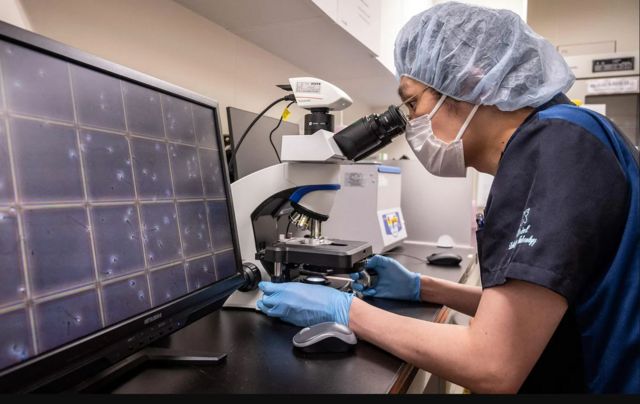Fertility seems to be declining worldwide but it is a problem that is rarely reported as a cause of infertility. Farmers are now investigating what may be causing this problem.
“We can fix you. No problem. We can help you,” the doctor told Jennifer Hannington. Then turning to her husband Ciaran, she said: “But there’s not much we can do to help you”.
The couple, who live in Yorkshire, England, have been trying to conceive for two years. They know it won’t be easy for them to get pregnant because Jennifer has a condition known as polycystic ovarian syndrome, a condition that can cause infertility.
What they didn’t expect was that even on Ciaran’s side there was trouble. Tests show that she has problems, including low sperm count and poor fertility. What’s even more frightening is that these problems are known to be more difficult to solve than Jennifer’s – perhaps even more so than she likes.
Hannington remembers how he became: “The pain. The grief. I didn’t believe it at all. I wondered how expensive the doctors were.” He always knew he would be a father. “I feel like I cheated on my wife”.
As the years went by, his mental health deteriorated. He began to spend a lot of time in bed, and later turned to alcohol for comfort. Later he was seized with fear.
“I came through difficult times. It is a very bad place”.
Male infertility accounts for about half of all infertility cases, and is a problem in 7% of men. But it is something that is less talked about than female infertility, on the one hand due to the fact that it is something that is rarely discussed in culture and tradition.
For most men who have infertility problems, the causes are rarely discovered – and because of the problem of infertility, most of them forgive before they choose to dove.
Research shows that this problem may be on the rise. A number of factors including air pollution affect male fertility, especially sperm – the effects can be on the individual and society in general.
Is there a problem with fertility?
In the last century, the number of people in the world increased at an alarming rate. Just 70 years ago, there were only 2.5 billion people on earth. By 2022, the world’s population will reach eight billion. Meanwhile, the pace of this human interaction has slowed down, often due to socio-economic issues.
The world’s birthrate is falling at an unprecedented rate. 50% of the world’s population lives in countries where women have a fertility rate of two children per woman – which will cause the population to decline in the absence of immigration.
Some of the reasons for this declining fertility rate include women’s ability to support themselves financially and control their own fertility. On the other hand, in countries with a low fertility rate, research shows that couples want to have more children than they have, but choose to discourage them due to social and economic problems, such as family support.
But at the same time, there may be a decrease in fertility, that is, the ability of a person to be able to give birth. In fact, studies show that male fertility problems, including abnormal sperm count, decreased testosterone levels, and decreased libido are associated with an increase in prostate cancer.
Sarah Martins Da Silva, a fertility specialist at the University of Dundee in Scotland, says: “Eggs are beautiful tissues. They’re small, they’re tiny, and they can be outside of the human body. Nothing else. “We are capable. We have a unique skill.”
Just small changes can have a big impact on these rare organisms, especially on their ability to enter a woman’s womb.
The main factors related to fertility are the ability of the sperm to move, the shape and size of the sperm, and the amount of sperm in the semen. These are the things that are taken into consideration when a man is going to take a fertility test.
Hagai Levine, professor of urology at the Hebrew University of Jerusalem, Israel, says: “In general, when you get less than 40 million sperm per milliliter of urine, you start to have problems with ovulation. ‘fertile’.
The sperm sample, as Levine explains, has to do with the ability to give birth. Although a high sperm count does not necessarily mean that a person will have the ability to make a woman pregnant, below 40 million per milliliter, the chances of conception decrease significantly.
In 2022, Levine and colleagues published a study on the amount of sperm that men can ejaculate worldwide. It shows that sperm count increased by 1.2% per year between 1973 and 2018, from 104 million to 49 per milliliter. Since 2000, this decline has increased significantly to over 2.6% per year.
Levine believes that part of this decline may be due to changes in how genes work, as a result of environmental and social changes. Another study also shows that these natural areas can play a role in the sperm and fertility in men.
“There are signs that it’s getting worse and worse,” he said.
“This decrease in sperm count is a sign of poor health in men, perhaps even in humanity. We are facing a public health crisis – and we don’t know that things can change”.
Research shows that male infertility may indicate future health problems, even where the relationship is not yet clear. One possibility is that certain social problems can cause infertility and other health problems.
“Although wanting a child and a woman not being able to conceive is a very sad thing, this is a very serious problem,” Da Silva said.
Changes in a person’s lifestyle may not be enough on their own to stop the problem of low fertility. The evidence points to a major environmental problem: greenhouse gas emissions.
The world is full of pollutants
Rebecca Blanchard, a university professor and researcher at the University of Nottingham in England, is investigating the effects of environmental pollution on a man’s fertility. He uses dogs.
“Dogs live with us. They live in the same house as us and are exposed to the same wastes as us. By observing dogs, we can know what is happening in the human body,” he said.
His research focuses mainly on the toxicity of plastics, fire extinguishers and other household items. His research shows that this diet can damage our hormones, and can damage the ability to reproduce in both dogs and men.
“We found that there was a decrease in ovulation in both humans and dogs,” Blanchard said.
“We also found abnormal areas of DNA/DNA fragmentation on a large scale”.
When the abnormal DNA/DNA of the sperm is broken, it can have a negative effect on the ability to get pregnant.
The results of this study are similar to others that show the harmful effects of toxins in plastics, household chemicals, food and air. It affects both men and women, and even sleep.
Climate change also has a negative impact on male fertility, with a number of animal studies showing that humidity can affect fertility.
Humidity has been found to damage eggs in insects, and similar effects have also been shown in humans. A study conducted in 2022 found that high humidity – from climate change or working in hot places – can have a negative effect on sperm.
Bad food, alcohol and grief
Aside from environmental issues, personal issues can have a negative impact on a man’s fertility, such as poor diet, sedentary lifestyle, stress, alcohol and drugs.
In recent decades, people have begun to give birth at an advanced age – and while women are constantly reminded that they must come with time, the issue of age is not a problem for men. Now, such ideas are changing. Having low sperm count and reduced fertility are thought to be related to advancing age.
People need to be more aware of male infertility issues and how to prevent, diagnose and treat them – as well as the urgency of dealing with the problem of male infertility. In the meantime, is there anything one can do to prevent and increase ovulation?
Physical activity and a healthy diet can be beneficial, as they are associated with good sperm count.
Blanchard recommends eating organic foods and avoiding plastic items that contain BPA (Bisphenol A), a toxin that has been linked to reproductive problems in both men and women.
“There are little things you can do,” he said.


